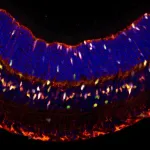New study validates lower limits of human heat tolerance
How much can our bodies adapt to a hotter and more humid planet?
2025-03-31
(Press-News.org)
A study from the University of Ottawa’s Human and Environmental Physiology Research Unit (HEPRU) has confirmed that the limits for human thermoregulation—our ability to maintain a stable body temperature in extreme heat—are lower than previously thought.
This research, led by Dr. Robert D. Meade, former Senior Postdoctoral Fellow and Dr. Glen Kenny, Director of HEPRU and professor of physiology at uOttawa's Faculty of Health Sciences, highlights the urgent need to address the impacts of climate change on human health.
The study found that many regions may soon experience heat and humidity levels that exceed the safe limits for human survival. "Our research provided important data supporting recent suggestions that the conditions under which humans can effectively regulate their body temperature are actually much lower than earlier models suggested," states Kenny. "This is critical information as we face increasing global temperatures."
Utilizing a widely used technique known as thermal-step protocols, Meade and his team exposed 12 volunteers to various heat and humidity conditions to identify the point at which thermoregulation becomes impossible. What made this study different, was that participants returned to the laboratory for a daylong exposure to conditions just above their estimated limit for thermoregulation. Participants were subjected to extreme conditions, 42°C with 57% humidity, representing a humidex of approximately 62°C. “The results were clear. The participants’ core temperature streamed upwards unabated, and many participants were unable to finish the 9-hour exposure. These data provide the first direct validation of thermal step protocols, which have been used to estimate upper limits for thermoregulation for nearly 50 years”, says Meade.
"Our findings especially timely, given estimated limits for thermoregulation are being increasingly incorporated into large scale climate modelling” explains Meade. "They also underscore the physiological strain experienced during prolonged exposure to extreme heat, which is becoming more common due to climate change."
The implications of this research extend beyond academia. As cities prepare for hotter summers, understanding these limits can help guide health policies and public safety measures. "By integrating physiological data with climate models, we hope to better predict and prepare for heat-related health issues," adds Kenny.
As the world grapples with the realities of climate change, this research aims to spark important conversations about our safety and adaptability in increasingly extreme environments.
For more information, read the study titled “Validating new limits for human thermoregulation”, published in the Journal PNAS.
END
ELSE PRESS RELEASES FROM THIS DATE:
2025-03-31
Texas has the most rural residents of any state, with nearly 3 million people spread across a vast landscape. If rural Texas were its own state, it would rank as the 36th most populous.
Yet, rural Texans face significant barriers to health care that their urban counterparts do not. More than a quarter of the state’s 172 rural counties lack a hospital, and those with at least one hospital often struggle with a shortage of qualified health care personnel, such as nurses and first responders.
To address these growing challenges, The University of Texas at Arlington introduced its new Mobile Simulation Lab on Friday. It’s the first in Texas dedicated ...
2025-03-31
Post-traumatic osteoarthritis (PTOA) is a condition that affects joints after an injury. Current treatments focus on relieving symptoms but do not prevent or stop the progression of the condition. Although emerging therapies have shown promise in preclinical studies, a major obstacle is delivering these therapies effectively into the joint, a highly dynamic environment subjected to constant mechanical stress. Researchers at Mass General Brigham have created a new hydrogel to improve drug delivery for treating PTOA. The hydrogel, ...
2025-03-31
ROCKVILLE, Md. – March 31, 2025 – The Association for Molecular Pathology, the premier global molecular diagnostic professional society, and pathologist Michael Laposata, M.D., Ph.D., today announced a favorable ruling in their lawsuit against the U.S. Food and Drug Administration over the regulation of laboratory-developed test procedures. The ruling by Judge Sean D. Jordan of the U.S. District Court for the Eastern District of Texas granted AMP’s motion for summary judgment ...
2025-03-31
Christopher M. Kramer, MD, FACC, today assumed the role of president of the American College of Cardiology, an almost 60,000-member global cardiovascular organization working to transform cardiovascular care and improve heart health for all.
“I see significant challenges and opportunities for the field of cardiology in the coming years, including workforce issues, health equity, diversity and inclusion, and AI-driven solutions, that need to be addressed to achieve ACC’s mission of transforming cardiovascular care for all,” ...
2025-03-31
Effective today, David E. Winchester, MD, MS, FACC, will serve as chair of the American College of Cardiology Board of Governors (BOG) and secretary of the Board of Trustees. His term will run one year from 2025-2026.
Winchester will lead governors from chapters representing all 50 states, the District of Columbia, Puerto Rico, Canada, Mexico and representatives from the U.S. health services. The BOG serves as the grassroots governing body of the ACC, a leading cardiovascular organization representing over 56,000 cardiovascular care team members around the world.
“Being Chair of the Board ...
2025-03-31
Embargoed for release until 5:00 p.m. ET on Monday 31 March 2025
Follow @Annalsofim on X, Facebook, Instagram, threads, and Linkedin
Below please find summaries of new articles that will be published in the next issue of Annals of Internal Medicine. The summaries are not intended to substitute for the full articles as a source of information. This information is under strict embargo and by taking it into possession, media representatives are committing to the terms of the embargo not only on their own behalf, but ...
2025-03-31
TUCSON, Arizona — A University of Arizona Health Sciences-led study found that patients are more likely to get colonoscopies following abnormal stool test results if patient navigators assist them through the process.
The paper, published in the Annals of Internal Medicine, showed that 55% of patients who were assigned to a patient navigator received follow-up colonoscopies within a year compared with 42.5% of patients who received usual care without a navigator.
“It is important for patients with abnormal stool test results to get a colonoscopy as soon as possible to prevent an increased risk of colorectal cancer and later-stage cancer detection,” ...
2025-03-31
Contact: Bess Connolly, 203-432-1324 or elizabeth.connolly@yale.edu
New Haven, Conn. — A Yale-led study warns that global climate change may have a devastating effect on butterflies, turning their species-rich, mountain habitats from refuges into traps.
Think of it as the “butterfly effect” — the idea that something as small as the flapping of a butterfly’s wings can eventually lead to a major event such as a hurricane — in reverse.
The new study, published in the journal Nature Ecology and Evolution, ...
2025-03-31
Aya Goldshtein, Omer Mazar, and Yossi Yovel have spent many evenings standing outside bat caves. Even so, seeing thousands of bats erupting out of a cave and flapping into the night, sometimes in densities so high that they appear liquid, astounds the scientists every time. But until recently, the bat biologists were even more baffled by what they didn’t see. “The bats don’t run into each other,” says Goldshtein from the Max Planck Institute of Animal Behavior, “even in colonies of ...
2025-03-31
The same genes could hold the key to regenerating cells in the ear and eye, according to a new mouse study from the USC Stem Cell laboratory of Ksenia Gnedeva, PhD, published in the Proceedings of the National Academy of Sciences (PNAS).
“The proliferation of progenitor cells in response to injury is a crucial step in the regeneration of sensory receptors, but this process is blocked in the mammalian inner ear and retina. By understanding the genes that enforce this block, we can advance efforts to restore hearing and vision in patients,” said Gnedeva, an assistant professor in the USC Tina and Rick Caruso Department of Otolaryngology ...
LAST 30 PRESS RELEASES:
[Press-News.org] New study validates lower limits of human heat tolerance
How much can our bodies adapt to a hotter and more humid planet?




